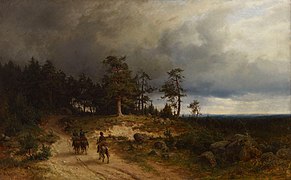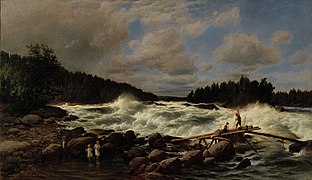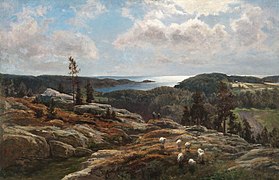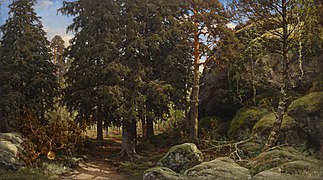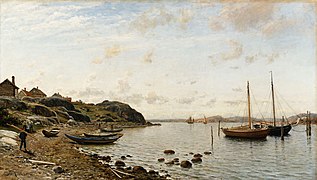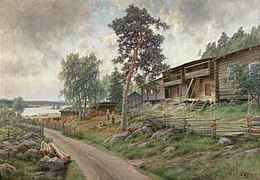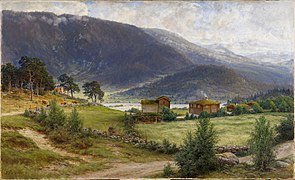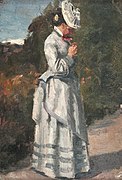Berndt Lindholm
You can help expand this article with text translated from the corresponding article in Finnish. (January 2018) Click [show] for important translation instructions.
|
Berndt Lindholm | |
|---|---|
 Berndt Lindholm. From the Swedish Portrait Gallery XX (1901) | |
| Born | 20 August 1841 |
| Died | 15 May 1914 (aged 72) |
| Education | Member Academy of Arts (1873) |
| Alma mater | Düsseldorf School |
| Known for | Painting |
Berndt Adolf Lindholm (20 August 1841 – 15 May 1914) was a Finnish landscape painter ( belonging to Swedish speaking population of Finland ). He is usually associated with the Düsseldorf School, but his work also displays early Impressionist elements.[1][2][3] He specialized in coastal scenes.[4]
Biography
[edit]He took his first drawing lessons from Johan Knutson in Porvoo.[5] From 1856 to 1861, he attended the drawing school of the Finnish Art Society in Turku, where he studied with Robert Wilhelm Ekman.[6] From 1863 to 1865, he attended the Kunstakademie Düsseldorf then went to the Academy of Arts in Karlsruhe for one year to continue his studies with Hans Gude.[7] In 1867 he arrived in Paris, where he was strongly influenced by the new French painting. He was the first Finn to embrace French landscape painting and apply it to Nordic nature. Upon returning to Helsinki, he was a teacher for a short time at the Finnish Art Society's drawing school, with the young Albert Edelfelt among his students.[8]
His first solo exhibition (Helsinki, 1870) was successful and, three years later, he was invited to become a member of the Imperial Academy of Arts.[3]
From 1873 to 1874, he was in Paris, where his teachers included Léon Bonnat.[9] He also came under the influence of Charles-François Daubigny and the Barbizon school. In 1876, he was awarded a medal at the Centennial Exposition in Philadelphia and received the Finnish State Prize the following year.[10]
That same year he settled in Gothenburg and became Curator of the city art collection in 1878; a position he held until 1900.[11] He also taught at the Valand Academy and was elected to the Royal Swedish Academy of Arts.[3] In addition to his painting, he provided illustrations for several works by Zacharias Topelius.[9]
His work is represented at the Nationalmuseum in Stockholm, the Turku Art Museum, Åbo Akademi University and the Gothenburg Art Museum and at museums in Norrköping and Vänersborg.[12]
Selected paintings
[edit]- Landscape in Eastern Finland with Mounted Cossacks, 1866
- Vallinkoski Rapid, 1872
- Steamboat in the Ice, 1875
- Ship on a Stormy Sea
- Oat Harvest on the Hisingen Island, 1878
- View of Ladoga, 1878
- Forest Interior, 1878
- Helsinki seen from Sörnäinen, 1881
- Shore Scene, 1882
- Landscape from Häme, 1896
- Norwegian Landscape, 1897
- Longing
- Rocky Hillside in a Pine Forest
See also
[edit]References
[edit]- ^ Reitala, Aimo (13 February 2008). "Lindholm, Berndt (1841 - 1914)". Kansallisbiografia. Retrieved 18 August 2020.
- ^ "Berndt Lindholm". Lähteillä. Retrieved 18 August 2020.
- ^ a b c Brief biography Archived March 4, 2016, at the Wayback Machine @ Kulta-Aika
- ^ "Berndt Lindholm 1841—1914". nykarlebyvyer.nu. Retrieved March 1, 2019.
- ^ Teuvo Termonen, Suomalaista postikorttitaidetta (Finnish Postcard Art), Suomen Postikorttiyhdistys Apollo 2006, ISBN 952-91-9956-2
- ^ "Robert Wilhelm Ekman". Biografiskt lexikon för Finland. Retrieved March 1, 2019.
- ^ "The Akademie der Künste (Academy of Arts)". Akademie der Künste. Retrieved March 1, 2019.
- ^ Vainio-Kurtakko, Maria (2022). Ett gott parti : Scener ur Ellan de la Chapelles och Albert Edelfelts liv (in Swedish). Svenska litteratursällskapet i Finland. ISBN 978-951-583-557-4.
- ^ a b Brief biography @ Virtuuali Vuoksi (Lapeenranta University of Technology).
- ^ "The Barbizon School: French Painters of Nature". The Metropolitan Museum of Art. Retrieved March 1, 2019.
- ^ Timo Huusko, Lindholm, Berndt: Koivumaisema (Birch landscape) Finnish National Gallery (2011) Online
- ^ "Berndt Lindholm (1841-1914)". Bukowskis. Retrieved March 1, 2019.[permanent dead link]
Further reading
[edit]- Jüri Kokkonen, Brita Löflund: Berndt Lindholm (exhibition catalog) Åbo konstmuseum, 1995 ISBN 952-95760-6-4


 French
French Deutsch
Deutsch